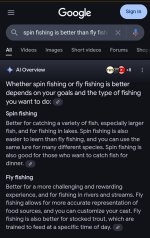jifigz wrote:
"Here's the real question... How can someone spend a lifetime pursuing trout as their preferred quarry and never become intrigued enough to want to dive head first into fly fishing?"
I wrote:
First of all, you do realize that your question reeks of fly-fishing elitism (i.e., snobbery), no? Like as if I'm some kind of a low-life Neanderthal who never outgrew the lowly spinning rod, since after all of these years I haven't become intrigued enough by fly-fishing to dive into it head-first.
I think you have read into it a bit too much. I don't judge you in any way for using a spinning rod. I don't care if you drown worms, fish spinners, float live crickets on the surface, or fish soft plastics on jigheads for trout. They can be caught using any and all methods, and it is still fun.
My reply: I stand by my statement. You clearly think that there is something so irresistibly intriguing (and better) about fly-fishing that anyone who fishes with any other method must be mentally deficient. You can live in denial all you want, but your words here and in other posts are clear.
*********************************************************************************************
A period of inactivity of not catching fish by supposed professionals in a YouTube who are doing "slow and boring" fishing is what makes you think fly fishing is a waste of time? First of all, you do realize that a statement like this reeks of spincasting and spinner fishing elitism, don't you? Does that imply that you would not have had that period of inactivity because you would have kept crushing fish on spinners? Have you ever had periods of inactivity when fishing? If not, you either quit five minutes after they quit biting, or you're lying. I am not aiming that question at you. I am aiming that question at everyone who labels themselves as a fishermen/angler.
My reply: When I wrote, "How exactly is slow, boring fishing like this (three 'expert' fly-anglers fishing subsurface for four hours and catching nothing), which looks pretty much the same as active bait fishing, supposed to intrigue me so that I want to dive head-first into fly-fishing?," I was not answering a question about whether or not I think fly-fishing is a waste of time, so please don't make things up that I never said. The question I was answering was your snobbish question, "How can someone spend a lifetime pursuing trout as their preferred quarry and never become intrigued enough to want to dive head first into fly fishing?" I was giving you just one example of why fly-fishing doesn't intrigue me.
I do not think my statement reeks of spinner-fishing elitism. I was just interpreting what I saw. Yes, I do think that fishing four straight hours and catching nothing is slow and boring. I'd say the same thing if someone went four straight hours fishing spinners and caught nothing. If you think fishing flies subsurface for four straight hours and catching nothing is fast and exciting, and not slow and boring, more power to you.
Years ago, Walt Young, expert fly-fisherman and creator of Walt's Worm, wrote a column in the Altoona Mirror about how fly-fishing is not all that difficult. In that article he stated that subsurface fly-fishing is really nothing more than active bait fishing. Do you think his comment reeks of elitism?
You asked if I have had periods of inactivity when fishing. I'm assuming you mean stretches of four hours (actually, twelve hours since it was three anglers fishing for four hours and catching nothing) since inactivity is relative, meaning that one could argue that if an angler is not catching a trout on every cast that there is inactivity.
I've gone fishing on 77 days so far this year and have caught 9,450 trout. I've caught 100 or more trout on 73 of those days, and in the 80's on three of the four days that I didn't top 100 trout. I'll ask you a question, "Do you think I'm quitting early due to inactivity or having long periods of inactivity?"
On this site it has been brought up in the past, mostly by doubter/moderator JackM, that there is never any verification as to the number of trout I catch. I usually fish solo, but a few days ago I ran into a friend of mine at daybreak and we spent the day fishing together. If interested, you can read his story about our day here, starting with post #21:

www.huntingpa.com
***********************************************************************************************
This is just my opinion, and it comes from being a hardcore spinning/baitcasting angler who looked down my nose at fly fishermen and trout fishermen for many years, but you cannot fully appreciate a trout and their behavior until you dissect hatches, until you can't figure it out, until there a fish rising all around you and they want to eat the tiniest midge. You can't fully appreciate them until you're on a tiny stream with gin clear water and ultra spooky fish, and nearly anything that splashes down in the water sends the trout scurrying, but maybe, just maybe you can land a parachute ant so gently along the bank that it won't send the fish scurrying for cover. You may fail, and if you do, you tell yourself you'll do better next time. Your stealth will improve, etc. In this situations, spinning rods and spinners are practically useless, and you can never fully understand that connection until you begin learning just how sensitive these fish are sometimes.
My reply: As a spinner-angler, I think I fully appreciate trout and their behavior. If I didn't fully appreciate trout and their behavior, I don't think I'd have the fishing success that I currently enjoy. Fly-anglers and spinner-anglers just have a different approach to figuring things out to tip the odds in their favor so that they can catch more and more trout. Fly-anglers tend to focus on what trout are eating. I consider what trout are eating to be one of the least important things. Bob Bachman studied wild trout on Spruce Creek many years ago and found that trout feed pretty much all day long. My fishing statistics show that my catch rates are similar all day long, so there is no reason to waste my time dissecting hatches. The important thing to me is that the trout haven't been disturbed by other anglers (or wildlife) and are hiding under cover. As long as trout are out feeding, some of them can almost always be caught (relative to conditions mentioned three paragraphs below).
In my 46 years of spinner-fishing I believe I could count on one hand the number of times I thought trout feeding on a hatch was greatly inhibiting my catch-rate. Contrary to the popular myth that fly-anglers like to perpetuate, seemingly to protect their egos, lots of trout can almost always be caught on spinners during hatches. In fact, casting to rising trout can be quite effective since I know the trout's location and that it is actively feeding.
One of the main things I do because I respect and appreciate trout behavior is that I wear full camouflage and cast my spinner from far enough upstream that they don't know I'm there. Few fly-anglers do this, which might be the reason why they can't figure out why the trout are rising all around them and they can't catch any. Maybe those trout have become super-alert for anything out of the ordinary because they see the fly-angler, but they risk continued feeding because an irresistible dinner is being served.
I also plan my days and sometimes adjust my plans during the day based on water temperatures, water levels, the weather, the time of day, the season of the year, aquatic weed-growth, the presence or absence of fallen leaves in the water, stream gradient, stream width, stream depth, the location of the sun in relation to the direction I'm fishing, the presence or absence of reservoirs, the odds of running into other anglers, the presence of other anglers, size of trout pursued, when my (or another spinner-angler's) last visit was to a particular stream, kind of stream (freestone, limestone or limestone-influenced), species of trout, and probably many other things that I can't recall right now. Suffice it is to say, deciding where I fish is a very involved process because all of these things affect trout behavior. When a spinner-angler understands and fully appreciates how these things affect trout and their behavior, that angler will find that there are very few times where spinning rods and spinners are practically useless, as you suggested above. My statistics support this.






